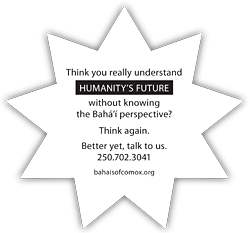In the second decade of Bahá’u’lláh’s ministry–a ministry that spanned almost fifty years (1853 to 1892)–He wrote to kings, rulers, and ecclesiastics, exhorting them to act in the best interests of the subjects and followers in their care. His words were ignored by most and drew haughty rebukes from some. This lost opportunity by the leaders set humanity on a more difficult road, by far, to its coming of age.
With rapid acceleration over the intervening years, material development–with its positive and deleterious effects–has overshadowed the spiritual development so crucial to an ever-advancing civilization. However, rather than falling into the depths of despair at the seeming hopelessness of the future, Bahá’ís embrace the potential for change and, through their faith in Bahá’u’lláh, act to help bring about the new world order enunciated by Him.
For examples of facets of the world-wide Bahá’í community that are, from a Bahá’í perspective, beacons to the peoples of the world, refer to the topic "A New Vision for Humanity’s Future." For a summary of the Bahá’í perspective on the establishment of a global commonwealth, written by Shoghi Effendi in 1936 but still of merit today, refer to the topic "Unity of the Human Race."
Other related documents that are still of merit today include
- a statement published by the Bahá’í International Community‘s Office of Public Information in 1999, "Who Is Writing the Future? Reflections on the Twentieth Century," that reviews recent history from a Bahá’í perspective and lays out what it means moving forward
- an article by Canadian Ann Boyle published for the first time in the 1993-94 edition of The Bahá’í World, "Choosing How to See the World: an Alternative to the Postmodern Perspective," that delves into the contradictions of recent history and proposes an alternative to the current world view from a Bahá’í perspective
For collaborative study of these and other subjects, please call the Bahá’ís of Comox (250.702.3041).

